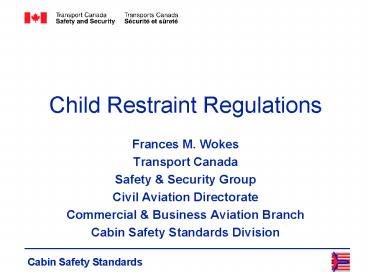Child Restraint Regulations - PowerPoint PPT Presentation
1 / 12
Title:
Child Restraint Regulations
Description:
Cabin Safety Standards. Regulation. Accepts ... Cabin Safety Standards. JOINT FAA ... Cabin Safety Standards. Aviation vs Automotive. Width between armrests ... – PowerPoint PPT presentation
Number of Views:31
Avg rating:3.0/5.0
Title: Child Restraint Regulations
1
Child Restraint Regulations
- Frances M. Wokes
- Transport Canada
- Safety Security Group
- Civil Aviation Directorate
- Commercial Business Aviation Branch
- Cabin Safety Standards Division
2
(No Transcript)
3
HISTORY
- 1979 and earlier
- Child Restraints forbidden
- Infants required to be held in arms of adult
- 1984 Exemption issued
- CRS permitted but not mandatory
- No obligation to accept
4
HISTORY Contd.
- 1996 Introduction of the CARs (Canadian Aviation
Regulations) - Incorporated the exemption into the regulation
- Not mandatory
- No obligation to accept
5
REGULATION
- CAR 605.26, (formerly Air Navigation Order Series
II, No. 2) requires infants (defined as one who
has not yet reached its second birthday) be held
in the arms of an adult or in an approved
infant/child restraint system during take-off,
landing and when seat belts are required to be
worn.
6
Regulation
- Accepts CMVSS 213 213.1
- Accepts FMVSS 213 except harness, vests,
booster seats - The sticker
- Does not accept any other standards
7
JOINT FAA/TCA TESTING - 1989
- Recommendation R D dedicated to the design of
a restraint system for infants and small children
traveling in aircraft be conducted without delay.
8
Aviation vs Automotive
- Width between armrests
- Base Dimensions
- Seat Pitch
- Installation Methods
- Installation Frequency
- Anchorage Points
9
Standard Reply
Without availability of an infant restraint
device designed specifically for use in aircraft,
it would be premature at this time to require
their use. Once the identified deficiencies
associated with aircraft use of the present
devices has been resolved, then it will be
possible to consider regulations to require their
use for the restraint of infants and children
traveling in aircraft Dependent upon the
results of this research project, consideration
will be be given to the development of a
regulation making their use on aircraft
mandatory.
10
PROJECT OBJECTIVE
- To determine the feasibility of developing a
child safety system which meets the needs of the
users, the airline industry, and the regulators.
11
STATUS
- Canadian Aviation Regulatory Advisory Council
Technical Committee VII tasked to consider
regulatory options that address the safety of
infants and children on board Canadian aircraft.
- TCVII unanimously agreed that current status quo
is unacceptable in medium to long term.
12
Thank You































